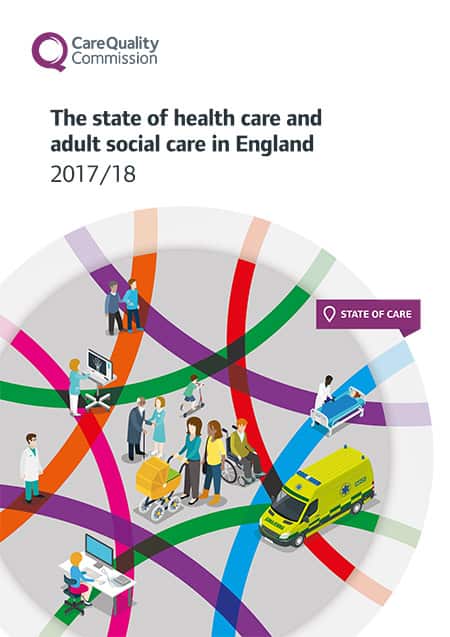CQC calls for more funding so local health services can work better together to deliver better care and tackle the ‘integration lottery’

An annual assessment, CQC’s latest State of Care report has found that despite ongoing challenges with funding and demand, health and social care in England has been largely maintained, and in some cases improved, from last year.
However, one of the main findings from the report shows that people’s experiences of care varies depending on where they live and that these experiences are often determined by how well different parts of local systems work together.
CQC’s reviews of local health and care systems found that ineffective collaboration between local health and care services can result in people not being able to access the care and support services in the community that would avoid unnecessary admissions to hospital, which in turn leads to increased demand for acute services.
The BHTA also recently proposed that better integration of services would be key to improving delayed transfers of care – or bed blocking – in hospitals.
According to the report, emergency departments were the core hospital service most likely to be rated ‘requires improvement’ (41 percent) or ‘inadequate’ (7 percent).
Ian Trenholm, Chief Executive of the Care Quality Commission, said: “This year’s State of Care highlights both the resilience and the potential vulnerability of a health and care system where most people receive good care, but where access to this care increasingly depends on where in the country you live and how well your local health system works together. This is not so much a ‘postcode lottery’ as an ‘integration lottery’.”
He added that until care providers work together effectively, they will struggle to meet demands, resulting in a poorer quality of care.
“There need to be incentives that bring local health and care leaders together, rather than drive them apart,” he continued. “That might mean changes to funding that allow health and social care services to pool resources; for example, to invest in technology that improves quality of care.
“The challenge for Parliament, national and local leaders and providers is to change the way services are funded, the way they work together and how and where people are cared for and supported.”
To help local health and care systems work together more effectively, CQC is calling for more long-term funding to address this issue.
Peter Wyman, Chair of the Care Quality Commission said: “Two years ago, we warned that social care was ‘approaching a tipping point’ – as unmet need continues to rise, this tipping point has already been reached for some people who are not getting the good quality care they need.
“It is increasingly clear without a long-term funding settlement for adult social care, the additional funding for the NHS will be spent treating people with complex conditions for whom care in the community would have been more effective both in terms of their health and wellbeing and use of public money.”
https://thiis.co.uk/cqc-calls-for-more-funding-so-local-health-services-can-work-better-together-to-deliver-better-care-and-tackle-the-integration-lottery/https://thiis.co.uk/wp-content/uploads/2018/11/Carers-UK-2.jpghttps://thiis.co.uk/wp-content/uploads/2018/11/Carers-UK-2-150x150.jpgNewsroomReports & ResearchThird SectorBHTA,care industry,Care Quality Commission,care sector,CQC,health and social care,State of Care reportA new report from the Care Quality Commission (CQC) has found that access to good care is increasingly dependent on how well local systems work together and that providers coming together can help meet care demands. An annual assessment, CQC’s latest State of Care report has found that despite ongoing...Calvin BarnettCalvin Barnettcalvin.barnett@bhta.comAuthorTHIIS Magazine


